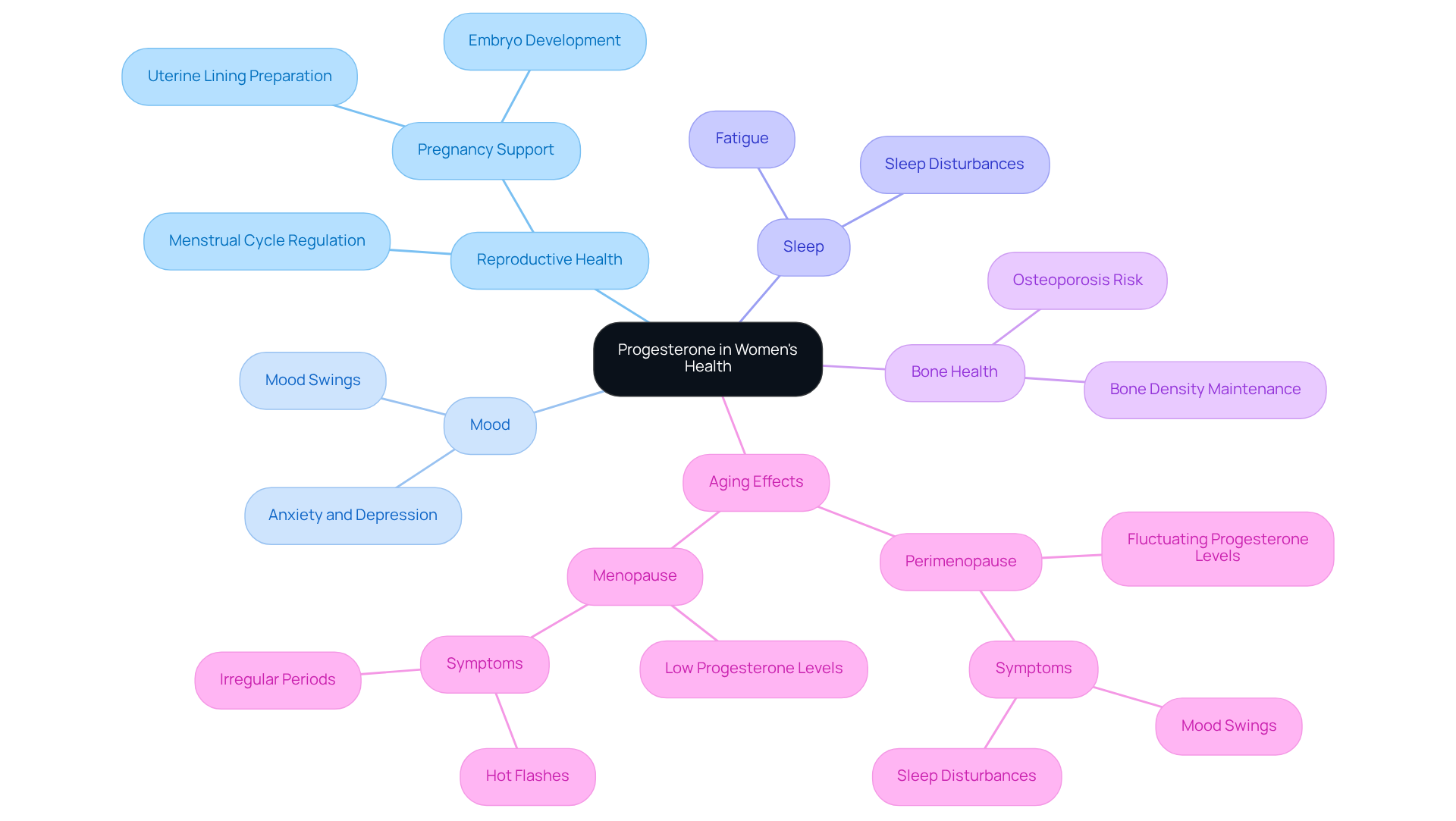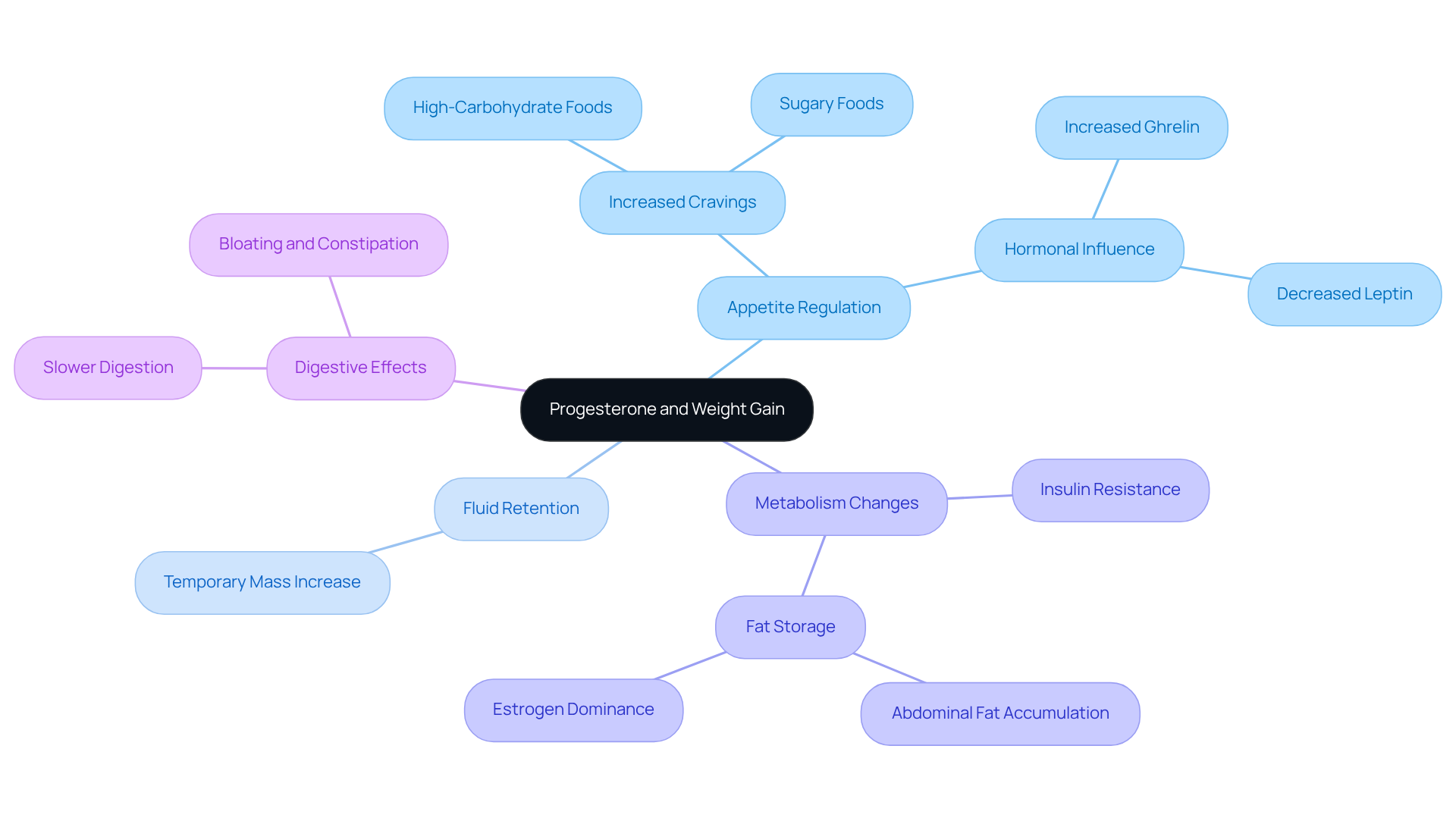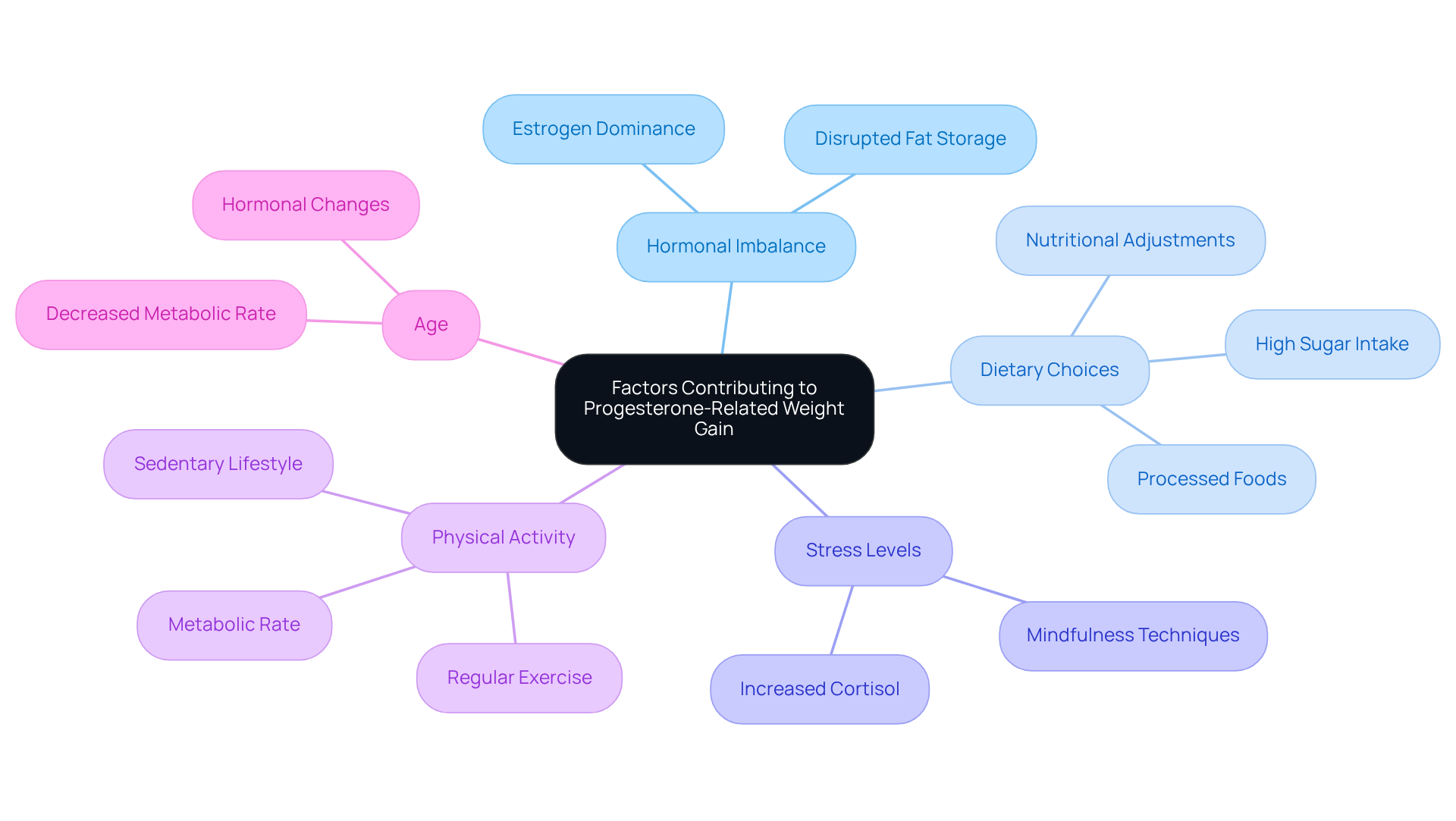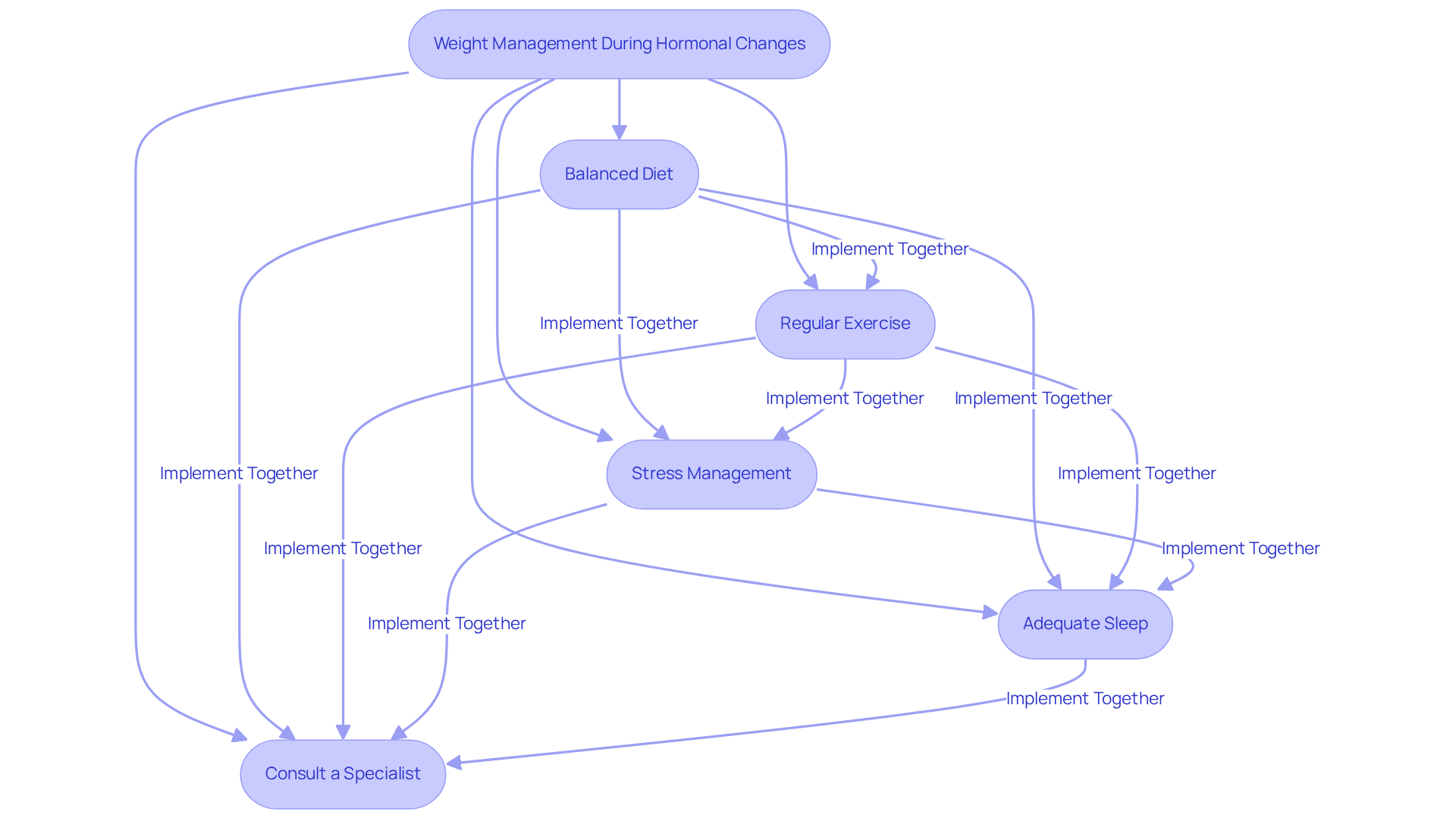Introduction
Understanding the relationship between hormones and weight is crucial for women’s health, especially regarding progesterone. This hormone is vital in regulating menstrual cycles and supporting pregnancy, but it also significantly impacts appetite, metabolism, and overall well-being. As women experience hormonal fluctuations throughout different life stages, recognizing how progesterone influences weight gain can empower them to make informed health choices.
But what happens when these hormonal changes lead to unexpected weight challenges? It’s a common concern, and you’re not alone in facing it. Exploring the connections between progesterone, lifestyle factors, and effective weight management strategies can reveal pathways to better health and wellness. Together, we can navigate these challenges and find solutions that work for you.
Explore the Role of Progesterone in Women’s Health
Progesterone is more than just a hormone; it’s a vital part of your well-being. Produced primarily in the ovaries, it plays a key role in regulating your menstrual cycle and maintaining pregnancy. It helps prepare the uterine lining for a fertilized egg and supports early pregnancy. But its influence goes beyond reproduction. Progesterone also affects your mood, sleep, and even bone health.
As we age, especially during perimenopause and menopause, progesterone levels can fluctuate. This can lead to various symptoms, such as mood swings, sleep disturbances, and changes in menstrual patterns. We understand how challenging these transitions can be, and recognizing the role of progesterone is crucial for managing your health effectively.
So, how can you navigate these changes? By understanding progesterone’s impact, you can take proactive steps to support your well-being. Whether it’s through lifestyle adjustments, seeking professional advice, or simply being more aware of your body’s signals, you have the power to make informed choices.
Together, we can address these concerns and find solutions that work for you. Remember, you’re not alone in this journey. Let’s take the next step towards better health and wellness.

Analyze How Progesterone Influences Weight Gain
Progesterone and weight gain are significantly connected through various mechanisms, especially its influence on appetite regulation and fluid retention. During the luteal phase of the menstrual cycle, when progesterone levels peak, many individuals experience heightened cravings and increased appetite. This hormonal surge stimulates ghrelin, the hunger hormone, while reducing leptin, which signals fullness. As a result, women may find themselves drawn to high-carbohydrate and sugary foods during this time.
Furthermore, progesterone can lead to water retention, causing temporary increases in mass that are often mistaken for fat buildup. Studies emphasize that endocrine changes, especially during menopause, can interfere with metabolism, making it more challenging to manage body mass. For instance, low progesterone levels can lead to estrogen dominance, promoting fat storage, particularly around the hips and abdomen.
Moreover, progesterone slows down smooth muscle contractions in the digestive tract, which can result in slower digestion, bloating, and constipation. Understanding these endocrine influences is essential for women, as it clarifies that variations in weight are often linked to hormonal changes like progesterone and weight gain, rather than solely lifestyle choices. By recognizing the connection between progesterone and weight gain, individuals can better navigate their wellness journeys.
At Woodlands Wellness & Cosmetic Center, we understand the challenges that come with hormonal fluctuations. We offer customized hormone replacement therapy options, including progesterone therapy, to help women effectively manage the impacts of these changes. Together, we can support your wellness journey. Schedule a consultation with our expert team today to explore how we can assist you.

Identify Factors Contributing to Progesterone-Related Weight Gain
Several factors contribute to progesterone-related weight gain, each interlinked with hormonal health and lifestyle choices:
- Hormonal Imbalance: Low progesterone levels can lead to estrogen dominance, a condition linked to weight gain. This imbalance disrupts the body’s ability to regulate fat storage effectively, potentially contributing to issues related to progesterone and weight gain.
- Dietary Choices: Diets rich in sugar and processed foods can exacerbate endocrine imbalances, leading to heightened cravings and complicating body management. Nutritional adjustments play a pivotal role in restoring endocrine balance.
- Stress Levels: Prolonged stress increases cortisol levels, which can disturb the balance of hormones and encourage gain in body mass. Managing stress through mindfulness and relaxation techniques is essential for maintaining hormonal health, particularly in relation to progesterone and weight gain.
- Physical Activity: A sedentary lifestyle can reduce metabolic rates, making it more challenging to control body mass, particularly during hormonal fluctuations. Regular physical activity is crucial for enhancing metabolism and addressing concerns related to progesterone and weight gain, contributing to overall well-being.
- Age: As females grow older, metabolic rates typically decrease, complicating management efforts related to body mass. Grasping this natural progression can assist in formulating effective strategies for sustaining a healthy body mass.
By acknowledging and tackling these interconnected elements, women can embrace a comprehensive strategy to enhance their well-being and manage their figures effectively. At Woodlands Wellness & Cosmetic Center, we understand the challenges you face. Our comprehensive medical loss program offers personalized support, including nutritional guidance and exercise plans, to help you navigate these challenges. Together, we can work towards achieving natural and sustainable fat loss, ensuring long-term success in managing your body and endocrine well-being.

Implement Strategies for Weight Management During Hormonal Changes
Managing weight during hormonal changes, particularly regarding progesterone and weight gain, can feel overwhelming, but you’re not alone in this journey. We understand the challenges you face, and there are effective strategies that can help you navigate these changes while promoting a healthier weight.
-
Balanced Diet: Start by focusing on whole foods. Incorporate plenty of fruits, vegetables, lean proteins, and healthy fats into your meals. Reducing sugar and processed foods can stabilize your blood sugar levels and help curb those pesky cravings.
-
Regular Exercise: It’s important to keep moving! Aim for at least 150 minutes of moderate exercise each week, combining both aerobic and strength training. This not only boosts your metabolism but also helps maintain muscle mass, which is crucial during hormonal shifts.
-
Stress Management: Stress can wreak havoc on your body, so practicing stress-reducing techniques like yoga, meditation, or deep breathing exercises can be incredibly beneficial. These practices help balance cortisol levels and enhance your overall well-being.
-
Adequate Sleep: Don’t underestimate the power of a good night’s sleep! Prioritize quality rest by aiming for 7-9 hours each night. Poor sleep can disrupt your body’s balance and increase appetite, making it harder to manage weight.
-
Consult a Specialist: Finally, consider collaborating with a healthcare provider. They can evaluate your hormone levels and discuss options like hormone therapy if needed. Customized treatment strategies can significantly improve your symptoms and assist in managing issues related to progesterone and weight gain.
By implementing these strategies, you can take proactive steps toward managing your weight during hormonal changes. Remember, together we can navigate these challenges and work towards a healthier you.

Conclusion
Understanding the relationship between progesterone and weight gain is crucial for women navigating hormonal changes. Progesterone is not just vital for reproductive health; it also influences various aspects of well-being, including appetite regulation and metabolism. By recognizing how fluctuations in this hormone can lead to weight gain, women can feel empowered to take charge of their health and make informed choices.
This article highlights several key insights. It discusses:
- Hormonal imbalances that can lead to weight gain
- The impact of dietary choices
- Stress levels
- The importance of physical activity
It’s important to note that weight variations are often linked to hormonal changes rather than solely lifestyle factors. By addressing these interconnected elements, women can develop comprehensive strategies to manage their weight effectively during hormonal transitions.
Ultimately, embracing a proactive approach to health is essential. Implementing balanced dietary habits, engaging in regular exercise, managing stress, prioritizing sleep, and consulting with healthcare professionals can significantly improve overall well-being. By acknowledging the influence of progesterone and taking actionable steps, women can navigate their wellness journeys with confidence and achieve sustainable health outcomes. Together, we can foster a supportive community that encourages each other to thrive.
Frequently Asked Questions
What is progesterone and what role does it play in women’s health?
Progesterone is a hormone produced primarily in the ovaries that is essential for regulating the menstrual cycle, maintaining pregnancy, preparing the uterine lining for a fertilized egg, and supporting early pregnancy. It also influences mood, sleep, and bone health.
How does progesterone affect women as they age?
As women age, particularly during perimenopause and menopause, progesterone levels can fluctuate, leading to symptoms such as mood swings, sleep disturbances, and changes in menstrual patterns.
What symptoms might indicate fluctuating progesterone levels?
Symptoms of fluctuating progesterone levels can include mood swings, sleep disturbances, and changes in menstrual patterns.
What can women do to manage the changes associated with fluctuating progesterone levels?
Women can manage these changes by understanding progesterone’s impact and taking proactive steps such as making lifestyle adjustments, seeking professional advice, and being aware of their body’s signals.
Is it common for women to experience challenges related to progesterone levels?
Yes, it is common for women to face challenges related to progesterone levels, especially during the transitions of perimenopause and menopause. Recognizing these changes is crucial for effective health management.









